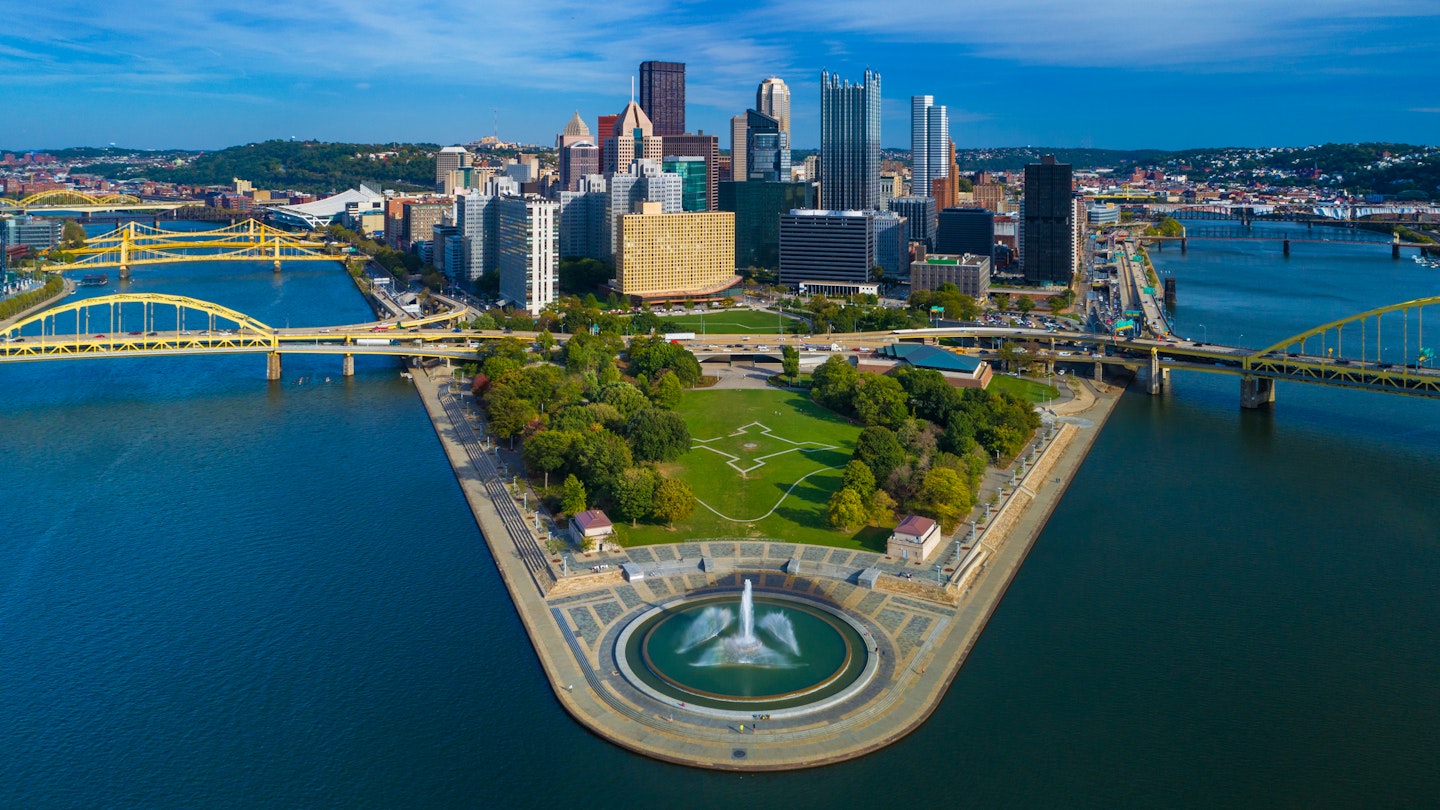Like many things in Pittsburgh, the parks system has strong ties to the city’s industrial heritage. Pittsburgh was once an industrial boomtown. However, with production comes pollution, and consequently, public demand for fresh air. As a result, the city set aside large green spaces for its residents.
Decades later, Pittsburgh has shed its smoggy reputation, but the glorious network of public parks remains. Scattered throughout the city, some parks are tiny, but many are expansive stretches covering hundreds of acres of city land. Though they’re all worth exploring, here are a few must-visit parks below.
Herrs Island
For as much as people talk about Pittsburgh’s rivers, not enough people talk about Pittsburgh’s islands. Without a doubt, Herr’s Island is one of the best, hugging the banks of the Allegheny River between Lawrenceville and The Strip. The island can be accessed by car, but it’s best to visit via the Three Rivers Heritage bike trail, which runs along the river.
From the trail, a converted train bridge connects the island to the shore. The bike path continues around the island, offering plenty of places to relax and enjoy views of Pittsburgh and the rolling Allegheny foothills.
West End Overlook Park
Mount Washington is Pittsburgh’s famous tourist viewpoint, but when locals want to enjoy a view of the city, they go to West End Overlook Park. The name “West End” hints at what this park is best known for: watching the sunset. Perched along a cliffside, the well-maintained parklet offers panoramic views of the city. Sunset is always the busiest time, but the views are stunning at any time of day. You’ll probably have to plug the park into your GPS to find it, but it’s worth the effort.
Schenley Park
It’s impossible to discuss parks in Pittsburgh without mentioning Edward Manning Bigelow, the city’s “Father of Parks.” As Director of Public Works, Bigelow was obsessed with improving Pittsburgh’s public spaces. Obtaining the land for Schenley Park was one of his greatest achievements, but it wasn’t an easy process.
The highly-coveted plot belonged to Pittsburgh heiress Mary Schenley, who lived in England. The story goes that Bigelow learned a group of developers were going to England to approach Schenley about selling the land. Bigelow raced across the ocean and begged her to donate instead, leaving her office just as the developers walked in.
Luckily for future generations of Pittsburghers, he succeeded, and Schenley Park has been an urban reprieve ever since. Like most Pittsburgh parks, Schenley offers a lot more than just grass and trees. There’s a lake, ice skating rink, botanical garden, and a beloved disk golf course, which is as much fun for people-watching as it is to play.
There are also less obvious nooks, like the Tufa Bridges. These arch bridges were built in 1908 out of Tufa, a porous stone that encourages moss to grow within the rocks, transforming into a fluid part of nature.
Riverview Park
With a gigantic domed observatory and dramatic views of the city, Riverview Park is like Pittsburgh’s own Griffith Observatory Park. But unlike the famous Los Angeles park, Riverview has four distinct seasons, all of which offer something different.
Summer is a favorite time for hiking and free jazz concerts. In the fall, the hillside transforms into a breathtaking quilt of color that’s perfect for early-morning hikes. Still, winter is the best time to visit. Once the trees have shed their leaves, the loop around the park provides 180° views of the entire city.
At the crest of the park sits the striking Allegheny Observatory. It’s only open to the public on Friday nights for tours, but the outside lawn is always accessible and always beautiful.
Hartwood Acres
Most people know Hartwood Acres for its free concert series. Every Sunday during the summer, thousands descend upon the park’s amphitheater lawn for live music and a picnic. Hartwood is located 11 miles north of the city, so it’s a bit of a trek to visit, but it would be a mistake to only stop by for the concerts.
The park encompasses over 600 acres and includes a Tudor-style mansion and horse stables. The mansion is open for tours year-round but best visited during the holidays when the elaborate Christmas decorations are on display. Next to the mansion is the meticulously maintained English-style garden, a must-visit for any gardener.
Another special spot are the Black-Eyed Susan fields, which bloom July-September. The fields are located next to the off-leash dog exercise area, one of the largest in Pittsburgh. In the winter, there are cross-country ski trails, as well as one of the best sledding hills in the city.
Frick Park
Henry Clay Frick, a business partner of Andrew Carnegie, is another industrialist whose name can be found all over the city. At the request of his daughter, Helen, he bequeathed the woodland next to his Point Breeze mansion to the city of Pittsburgh upon his death.
This was the start of Frick Park, which is now Pittsburgh’s largest urban park. The stunning park is of another era, featuring bowling greens, red clay tennis courts, and elaborate stone-arch entrances.
Fans of the late hip-hop artist Mac Miller should make the pilgrimage to Blue Slide Park playground, located within Frick Park. Miller, a Pittsburgh native, named his debut album after the playground and its famous blue slide, which requires a sheet of cardboard to ride.
Allegheny Commons Park
For years, Allegheny Commons Park has been at the forefront of Pittsburgh Parks Conservancy restoration efforts. As a result, Allegheny Commons takes visitors back in time to 1867, when the park first opened with arch bridges, wide promenades, and elaborate fountains. Still, all Pittsburghers know the park’s real hotspot (or cool spot?) is Gus and YiaYias, an ice ball stand that’s been serving customers from the same corner since 1934, or when “your dad was a lad,” as the lacquered letters on the orange cart say.





